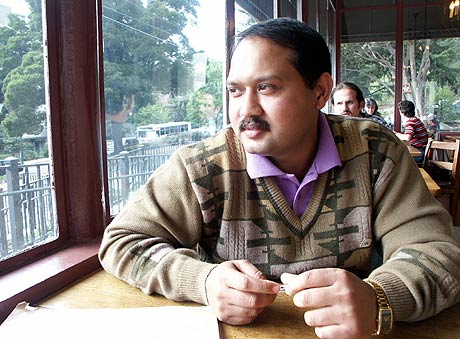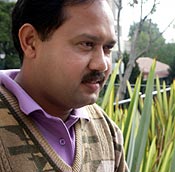
Nani
Mahanta in the café of the International House,
where he is living while he studies peace and conflict
resolution for two years. Photos by BAP |
World
Peace Scholar Nani Mahanta hopes to bring tools for peace
home to northeast India
6 November 2002
By Bonnie Azab Powell, Public Affairs
BERKELEY
- Rotary World Peace scholar Nani Mahanta did not come
to UC Berkeley simply for a second master's degree.
Mahanta
is from Assam, a state in northeast India under siege by the
United Liberation Front of Assam (ULFA). Intent upon seceding
from India and forming an independent Islamic country, ULFA's
tactics include extorting money from Assamese businesses,
blowing up oil pipelines, and attacking the state police and
government army.
"Violence
begets violence — I have seen it in my society,"
Mahanta says, his face stony with intensity. "This is
not just a pedagogical interest for me. I'm on a mission.
I want to learn how we can create a culture of peace."
ULFA is
just one of the many problems that plague Assam, including
high unemployment, porous international borders, and ethnic
tensions. Mahanta, a political science lecturer at Gauhati
University in Assam, has taken temporary leave from his wife,
his child and his job, and come to Berkeley resolved to become
a peacemaker.
Although
he's only 33, Mahanta has already accumulated the experience
that just might allow him to transform study into action.
In addition to his university post, he is the director of
the Assam group of the International Peace Initiative, collaborating
with UNICEF on a study of terrorism's effect on children.
Mahanta is general secretary of the North-East India Political
Association and works with the Regional Centre of Strategic
Studies, under whose auspices he has visited Sri Lanka, Bangladesh,
and Bhutan for research. A former newspaper reporter —
he still writes frequent opinion pieces for The Sentinel in
Assam — he is also an intrepid filmmaker.
| |
|
 |
'It
is not as simple as how to bring the terrorists to the
table. The decay has entered into the social, political
and economic fabric.'
—Nani Mahanta, Rotary World Peace Scholar |
After
writing about ULFA for his dissertation for his master's in
political science, Mahanta met the group's leaders while filming
"Insurgency in Assam: The Long March toward Uncertainty,"
a documentary on the group that was broadcast on state-owned
Indian television. It was not an easy project. After waiting
in a hotel for three days to make contact, Mahanta was blindfolded
and led on a terrifying all-day drive into the jungles of
Assam's neighbor Bhutan. There, he met with ULFA's leaders
but was not permitted to ask questions; they expected him
merely to record their mission statement and demands. His
cameraman was so shaken by the experience that he fled to
Delhi immediately afterward.
ULFA is
just the latest group to disrupt the Assamese, who have experienced
little peace and even less economic growth in the last 60
years. Pulling out a piece of scrap paper, Mahanta begins
sketching a map of the region and drawing arrows to illustrate
the threats. A state that protrudes from northeast India like
a sore thumb, Assam's geographic location has often put it
in harm's way. Its neighbors Bangladesh, Bhutan, and Myanmar
(where there's an infamous international arms market) account
for nearly 90 percent of its borders. Assam itself is fragmented:
after India gained independence from Britain in 1947, India's
government bowed to the demands of tribal districts and shaved
off parts of Assam into five additional smaller states.
There is
little industry. Although Assam produces more tea than any
other state in India, few of the better-paying jobs and the
profits associated with the commodity stay in the state but
instead are funneled to Delhi. When the civil war over Pakistan
in 1971 poured a flood of Bengali Muslims into Assam, followed
by a later influx of Bangladeshi refugees, the depressed economy
was destabilized further.
In 1979 Assamese students began agitating, demanding that
illegal immigrants be given rights to Assamese citizenship
and suffrage. Both the state and Indian governments acted
forcefully to quell the movement, but the students persisted
and were joined by "all the people of Assam, regardless
of caste or tribe," says Mahanta. In 1985, the students
signed a treaty and were elected to power in the government.
"There were a lot of expectations, but they just caused
chaos," says Mahanta. "They basically went from
a popular protest at the university to plundering the capital."
The remnants of the student party were ousted in 1990.
Nowadays,
ULFA seems to exert more power than the local government,
engaging in frequent bloody clashes with the army. Mahanta
says that ULFA extorts payments of as much as 70 percent on
some projects, discouraging outside investment. Their collaborators
are everywhere. "You
will find the latest model of every car in Assam — our
cars look just like yours," Mahanta says, pointing out
the window at cars passing by the International House Café.
"But where does the money come from in a state with absolutely
no economy?"
Mahanta is not at Berkeley to learn better methods for negotiating
with ULFA and its brethren. "Mediation goes only so far,"
he says firmly. "It is not as simple as getting the terrorists
to the negotiation table. The decay has entered into the social,
political and economic fabric: if you satisfy one bunch of
people, there will be others. We must address the root causes."
Currently Mahanta is taking a Peace and Conflict Studies course
with assistant professor Nancy Erbe (director of Berkeley's
Rotary Center for International Studies in Peace and Conflict
Resolution) and lecturer Darren Zook's political science course
on the origins of war, violence, and terrorism. He hopes to
introduce what he learns about conflict resolution to Gauhati
University, where there are no such course offerings. "I
want to incorporate conflict resolution into the education
process, to teach that we must respect other people's rights,"
he says.
Education
is just the first part of his plans. He wants to promote investment
in Assam through non-governmental organizations (NGOs) that
will concentrate on social welfare issues. That will require
lobbying the government to give tax incentives to entice them
to Assam. His role model is Chandrababu Naidu, chief minister
of Andhra Pradesh, who has transformed that Indian state's
economy and attracted investment from technology companies
into Hyderabad, its capital.
But any plans for economic expansion will have to deal with
ULFA, whose goal of Muslim separatism has recently begun enjoying
support from the military intelligence wing of Pakistan, known
as ISI. About ten Islamic terrorist groups have been growing
in strength in various parts of Assam, according to Mahanta.
The consequences have been severe: the easy availability of
small arms has enabled various ethnic groups to turn to acts
of violence to achieve their political objectives, including
killing many Hindi-speaking Assamese people originally from
central India. The federal government's response has been
tragically ineffective, in Mahanta's opinion: "The response
of the state has always been in the form of extremes —
either confrontational and militarist or pacifying and escapist."
His goal, ultimately, is to make a difference from within.
He would like to stand for election to Assam's parliament
or state assembly. "That's the only real way to make
people's lives better," he says. "In our world,
government is powerful, maybe too powerful, but that is the
best way to get things done."
|